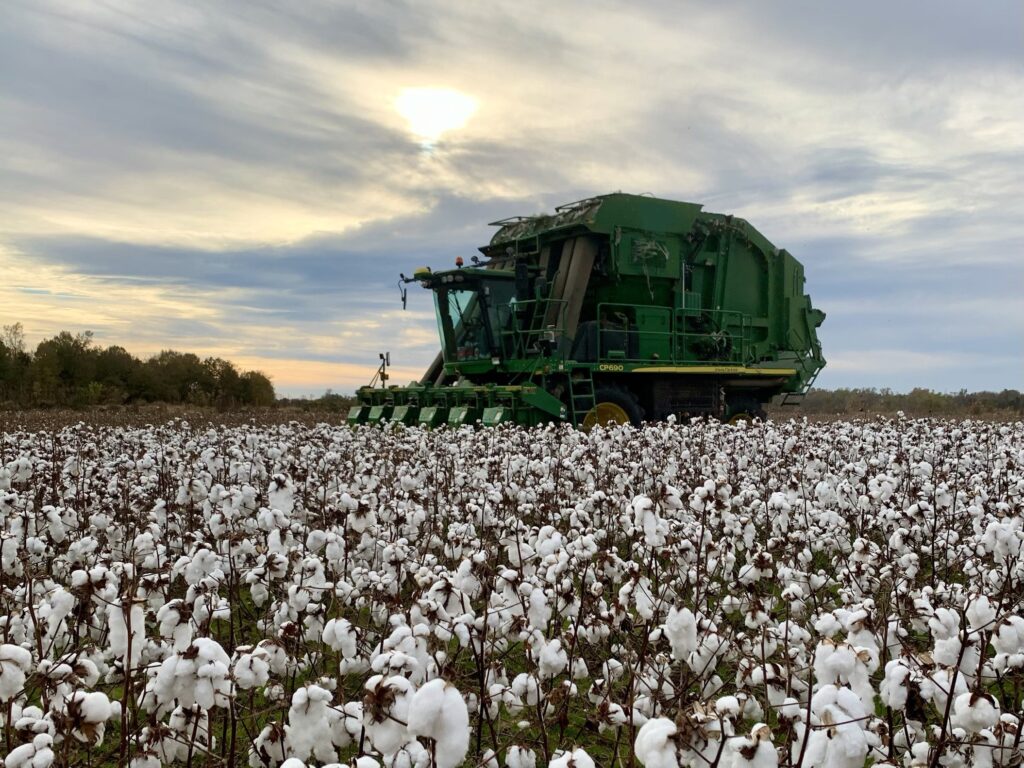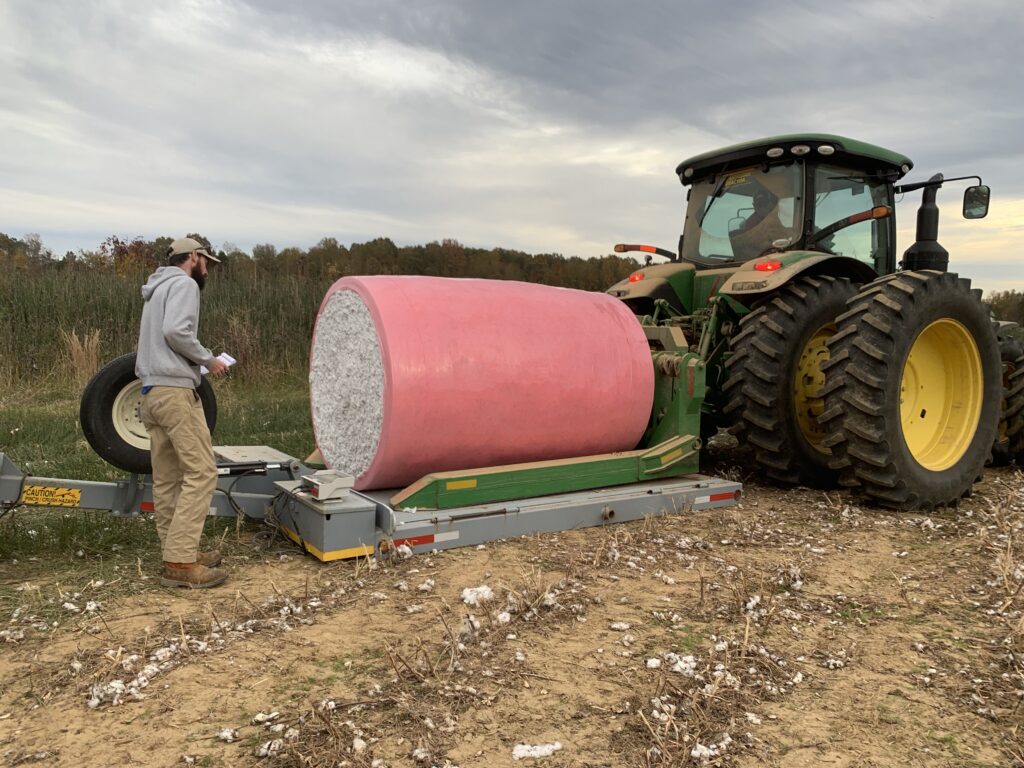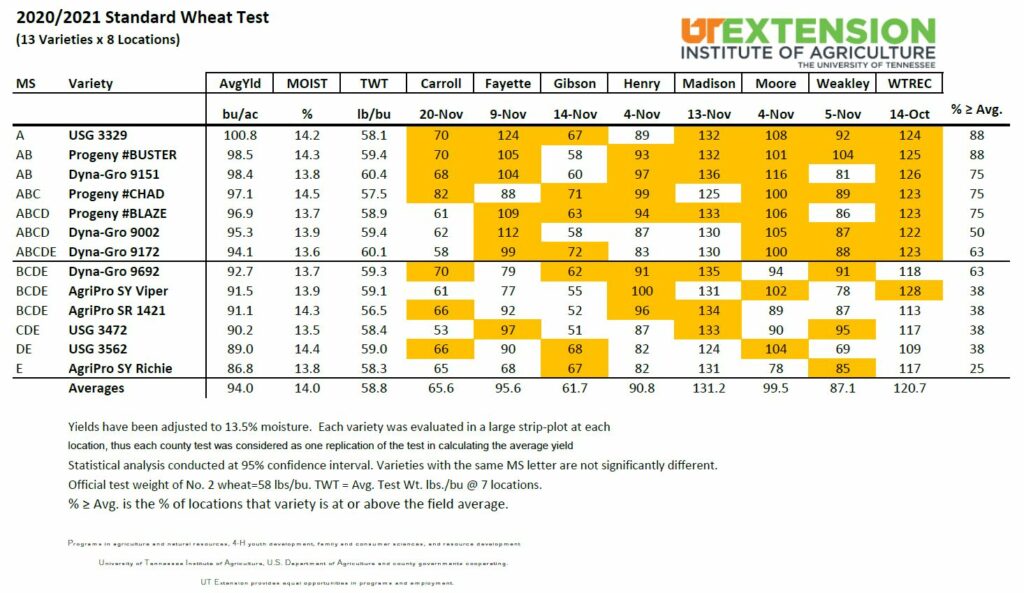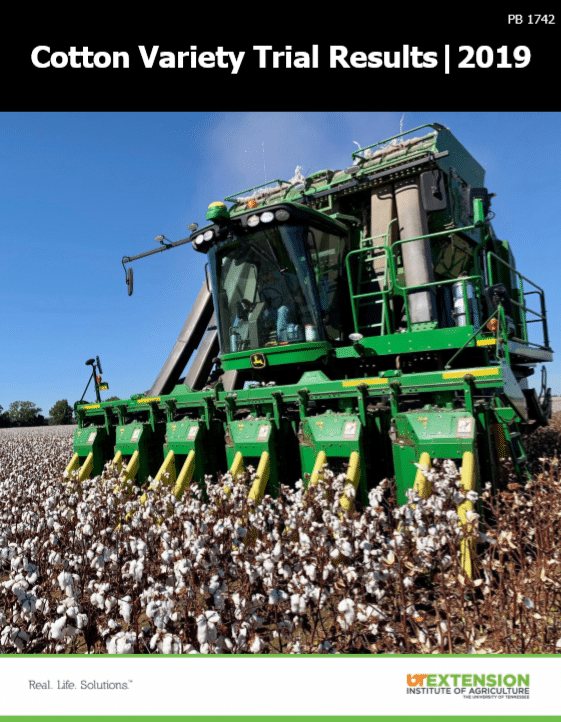 The 2021 Tennessee Cotton Variety Trial Results Publication (PB 1742) is now available online. Included within these results are ten large strip trials (CSTs) testing 15 XtendFlex commercial varieties, three large strip trials (CSTs) testing 5 Enlist commercial varieties, and six small plot trials (OVTs) testing 41 experimental and commercial varieties.
The 2021 Tennessee Cotton Variety Trial Results Publication (PB 1742) is now available online. Included within these results are ten large strip trials (CSTs) testing 15 XtendFlex commercial varieties, three large strip trials (CSTs) testing 5 Enlist commercial varieties, and six small plot trials (OVTs) testing 41 experimental and commercial varieties.  Special thanks to all of the agents and producers who helped generate this data. Additionally, thanks to the USDA Classing Office in Memphis for assisting with this effort. If you have any questions on location response or variety placement, please do not hesitate to reach out directly to your county agent.
Special thanks to all of the agents and producers who helped generate this data. Additionally, thanks to the USDA Classing Office in Memphis for assisting with this effort. If you have any questions on location response or variety placement, please do not hesitate to reach out directly to your county agent.
All posts by Ryan Blair, County Variety Trial Coordinator
Preliminary 2021 Cotton CST Data
 Preliminary data from the 2021 TN Cotton CSTs is now available. We are releasing an average table for the XtendFlex trials and the Enlist trials today and hope to release the quality and individual location results in the near future. Keep in mind the XtendFlex and Enlist trials are conducted separately, so direct comparisons between tables cannot be made from this dataset. Also, stay tuned for the OVT small plot trial data average table which includes 41 commercial and pre-commercial varieties. Continue reading
Preliminary data from the 2021 TN Cotton CSTs is now available. We are releasing an average table for the XtendFlex trials and the Enlist trials today and hope to release the quality and individual location results in the near future. Keep in mind the XtendFlex and Enlist trials are conducted separately, so direct comparisons between tables cannot be made from this dataset. Also, stay tuned for the OVT small plot trial data average table which includes 41 commercial and pre-commercial varieties. Continue reading
2020/2021 Wheat Data (County Standardized Trials)
A great big THANK YOU to our County Agents and cooperating growers for getting in and out this year’s County Standardized Trials Wheat Test. With Covid ramped up last fall, we had fewer entries into our trials because of issues with supply and workers in the warehouses. I was happy to see such good yields across the state for a lot of growers. Looking at our plant dates, early planted wheat had an advantage over planting middle to the latter part of November. We had a few scares across the northern counties with the late freeze, and across much of the state during grain fill we were cooler and wetter than desired. Our target varieties seem to be more tolerant to these stressors and in most cases, overcame.
The table below has the results from 8 County Trials, testing 13 varieties. Our average range in yield was from 62 bushel to 131 bushel per acre with an overall average of 94 bu/ac. UT recommendations are to select varieties in the “A” group as our top performers.
-MS (mean separation) Varieties with the same letter are not significantly different
-Orange Blocks show varieties’ yield above the location’s average
-% ≥ Avg. is the % of locations that variety is at or above the field 2021 wheat
Click on table for a full PDF
2020 County Standardized Trial Handout
A special thanks to all cooperators, agents, and all others who make the County Standardized Trials Program a success.
With Covid limiting in-person meetings and office visits, I want to make available the 2020 CST handout. The above link is available for you to use in assisting variety/hybrid selection for the coming season. Agents, feel free to print and send out or send this attachment to your row crop producers via email. The full report above contains data from 2019 and 2020 for corn and soybean, 2020 Wheat, and 2020 Cotton.
The following links are segments of the full report to simplify searches through all 2020 CST data.
Preliminary 2020 Cotton CST Data released
 Preliminary data from the 2020 TN Cotton CST Data is now available. We are releasing an average table for the XtendFlex trials and the Enlist trials today. We only tested the XtendFlex and Enlist varieties together in a handful of locations. I will release the average tables from those locations later, along with results from each individual location. Also, stay tuned for the OVT small plot trial data average table which includes 44 commercial and pre-commercial varieties. The last of the OVT samples should gin during the first of next week. Continue reading
Preliminary data from the 2020 TN Cotton CST Data is now available. We are releasing an average table for the XtendFlex trials and the Enlist trials today. We only tested the XtendFlex and Enlist varieties together in a handful of locations. I will release the average tables from those locations later, along with results from each individual location. Also, stay tuned for the OVT small plot trial data average table which includes 44 commercial and pre-commercial varieties. The last of the OVT samples should gin during the first of next week. Continue reading
2019-2020 CST Wheat Variety Trial Results-
County Standardized Trial (CST) Wheat Results are now available. The 2019 planted wheat crop had it’s challenges to say to the least. Between delayed harvest of the 2019 crop, wet fall, wet spring, late freezes etc. this crop had everyone guessing how it would turn out.
The CST program was able to use data collected from 7 locations (Carroll, Fayette, Gibson, Madison, Moore, Weakley, WTREC) to compile this dateset representing 18 varieties commonly available to TN producers. Overall, the varieties averaged 70 bu/ac with a location average range from 52-97 bu/ac. Varieties are separated statistically at a 95% confidence interval indicated by the Mean Separation, “MS” column. Varieties that have the same letter in the MS column are not significantly different from each other.
CST plots are on-farm large strip trials in design, with a minimum plot length of 300 ft. These plots are conducted using common agriculture practices supported by UT recommendations. Special thanks to everyone involved, especially those cooperating producers and County Agents who make this possible .
Upcoming Events
January 24, 2020 – Gibson County Extension Crop Production (Ed Jones Agri-plex) 8:00 a.m. – 2:45 p.m. (Contact Philip Shelby for details)
January 30-31, 2020 – Cotton & Rice No-Till Conference (Memphis, TN)
February 3, 2020 – Henry County Extension Crop Production (Henry Co. Fairgrounds) 6 – 9 p.m. (Contact Ranson Goodman for details)
February 4, 2020 – Middle Tennessee Grain Conference (UT Space Institute in Tullahoma, TN)
February 6, 2020 – West Tennessee Grain and Soybean Conference (Dyer Co. Fairgounds, Dyersburg, TN)
February 7, 2020 – KY/TN Grain Conference (Russellville, KY)
February 11, 2020 – Haywood/Madison Extension Crop Production (Samuel T. Bryant Distillery, Jackson, TN) 9AM-12PM (Contact Jake Mallard or Lindsay Stephenson for details)
February 12, 2020 – Tennessee Agricultural Production Association Winter Agronomic Workshop (DoubleTree Hotel, Jackson, Tennessee) 8 AM – 4 PM
February 13, 2020 – Cotton Focus (West Tennessee Research and Education Center, Jackson, TN) 8 AM-12PM (lunch provided, pre-registration is not required)



